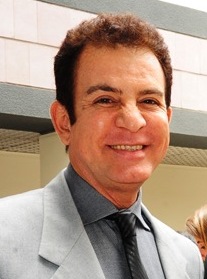News
Honduran opposition rejects president’s lead in last tally

FILE: Salvador Nasralla (Photo By Byga99 – Own work, CC BY-SA 4.0)
TEGUCIGALPA, Honduras — The final vote count in Honduras’ presidential election left the incumbent with a narrow lead Monday, while the main opposition candidate called the tally a fraud and urged the police and armed forces to take control “to ensure the votes of people are respected.”
Electoral officials said they were not declaring a winner yet, to allow the filing of challenges and appeals.
Opposition candidate Salvador Nasralla said at a news conference that he would take his case for a wide recount to the Organization of American States after a hand-count of more 1,000 problematic ballot boxes wrapped up Monday, eight days after the election.
“I am the president-elect of Honduras, the president chosen by the people,” said Nasralla, who had a five-point lead when nearly 58 per cent of the votes were counted in the first hours after the Nov.
26 election. The count then slowed dramatically, and his lead gradually disappeared as results dribbled out, leading the opposition to claim the election was being stolen by President Juan Orlando Hernandez.
Nasralla said he wants the OAS “to examine all the electoral documents that Hernandez manipulated to rob me of my victory.” Over the weekend, he also called for a redo of the entire presidential election.
Nasralla, a well-known TV personality, alleged Monday that the special hand-count was a “fraud” with “false, fixed, arranged votes.”
Referring to reports that some police officers were striking over pay issues, he called on them to join his cause. The national police force countered that unfounded rumours about the supposed cancellation of policemen’s Christmas bonus may have caused discontent and rushed to reassure officers they would be paid.
Officials blamed the slowness in the vote count on technical problems and deny any manipulation of the ballots.
Hernandez, who also already claimed victory, urged calm and national unity.
“I extend my hand to all contenders and sectors of the country to build a new Honduras,” he tweeted. “The results of this election leave us with a great hope. … My commitment to working for peace and tranquility in Honduras is more alive than ever.”
Hernandez expanded his lead in the final count by the electoral tribunal from about 46,000 votes to about 52,000. He said at a news conference that the election process wasn’t formally over, because there is still a 10-day period in which appeals can be filed.
Electoral tribunal president David Matamoros said 100 per cent of the ballots had been tabulated — although the website still showed 0.04 per cent left to count. He said the court was not declaring a winner, adding “we will do that later.”
The OAS observer mission issued a report saying “the tight margin of the results, and the irregularities, errors and systemic problems that have surrounded this election do not allow the Mission to hold certainty about the results.”
The last ballot boxes that presented “inconsistencies” were examined without the presence of Nasralla and his Opposition Against Dictatorship alliance, which chose not to send representatives as vote tallying continued.
The U.S. Embassy said in a statement that it was “pleased Honduran election authorities completed the special scrutiny process in a way that maximizes citizen participation and transparency.”
It also said it supports international election observers working “to increase the transparency of the process” and called on politicians “to ensure a result that represents the will of the Honduran people.”
Marisa Matias of the European Union observer mission urged electoral officials to be flexible and respect a reasonable time frame for parties to present any petitions or challenges. She added that the petitions the mission had seen so far “are reasonable.”
“The process is far from being over,” Matias said.
At OAS headquarters in Washington, as Secretary-General Luis Almagro was taking part in a forum on human rights, about a dozen protesters held signs with slogans such as “(hashtag) Honduras. No to repression” and “(hashtag) Honduras. More democracy.”
Hernandez’s government is enforcing a 10-day curfew of 6 p.m. to 6 a.m. to quell demonstrations, although it was dropped Saturday for the country’s two main tourist areas, the Bay Islands and the Mayan ruins of Copan.
Late Sunday, the capital had another night of pot-banging protests over delays in the vote count, and the sound of bottle-rockets and chants echoed across the city.
Clashes between protesters and troops have killed at least one person and perhaps as many as a half dozen. Police spokesman Jair Meza said nearly 800 people were detained during the first two nights of the curfew.
The protests have been reminiscent of those following the 2009 coup that ousted former President Manuel Zelaya, whose Libre party is the key partner in the coalition led by Nasralla that formed in a bid to unseat Hernandez.
Officials said Zelaya was ousted for considering re-election, which is against Honduras’ constitution. But the country’s top court threw out that prohibition so Hernandez could seek a second term.
At a news conference Monday, Zelaya said his opposition alliance had won the election, disavowed the results and promised acts of civil disobedience to protest.
“The people will defeat the fraud, no matter the cost, in the streets where they will wage the great battle for the homeland,” Zelaya said.





















